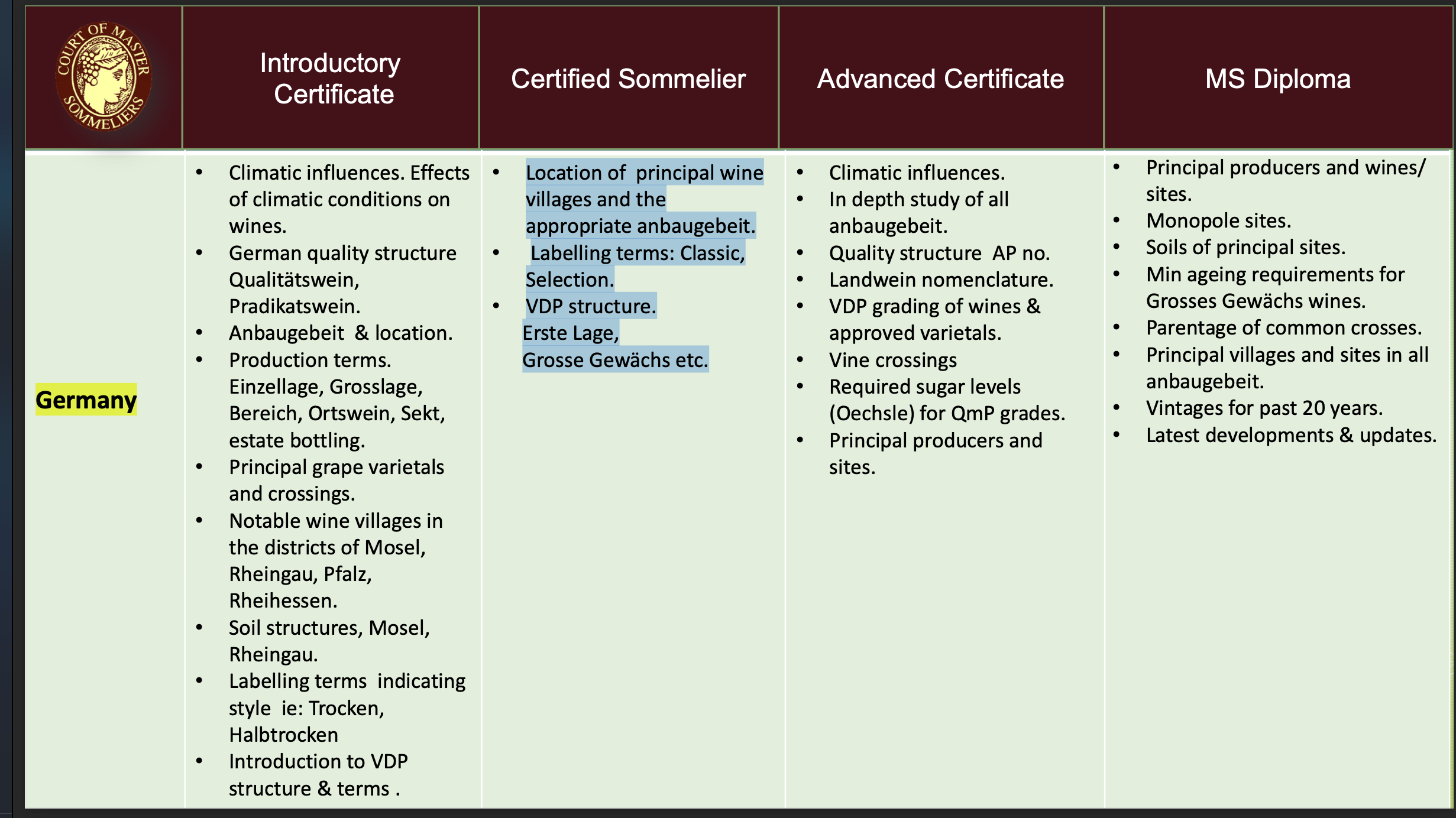What Should Sommeliers Know About German Wines for CMS Level 1?
A deep understanding of German wines is essential for aspiring sommeliers preparing for the CMS Level 1 exam. This guide provides a comprehensive look into the classifications, climatic influences, regional distinctions, notable grape varieties, and influential producers that define Germany's rich and complex wine landscape.
German Wine Classifications: A Detailed Overview
German wine classifications are fundamental in navigating the complexity of this region's wines. Here’s what you need to know:
Qualitätswein: Sourced from one of the 13 designated wine regions, these wines meet specific production standards. They must pass a taste test and meet chemical composition criteria, ensuring a baseline quality that consumers can trust.
Prädikatswein: Representing a hierarchy within the German wine classification, this includes several levels based on grape ripeness and sweetness at harvest:
Kabinett: Typically light wines are made from grapes picked during the normal harvest.
Spätlese: Meaning "late harvest," these wines are made from riper grapes, resulting in a richer taste.
Auslese: Made from selected ripe bunches, often richer and sweeter.
Beerenauslese (BA) and Trockenbeerenauslese (TBA): These are produced from individually selected grapes affected by noble rot and are intensely sweet and complex.
Eiswein: Made from grapes frozen on the vine, then pressed while frozen to concentrate sugar, acidity, and flavor.
Climatic Influences on German Wines
The climate of Germany's wine regions greatly affects the viticulture and the styles of wine produced. The key factors include:
Cool Temperatures: These are conducive to growing grapes like Riesling, which benefit from a long growing season to develop flavor complexity and maintain high acidity.
River Valleys: Many vineyards are situated along rivers like the Mosel, Rhine, and Main, which help moderate the climate, reflecting sunlight and protecting vines from extreme cold.
Microclimates: The varied topography creates distinct microclimates that can significantly influence the grapes' ripening and wine's characteristics.
Key Grape Varieties
While Riesling is the star of German viticulture, there are other important grape varieties:
Riesling: Known for its versatility and capacity to express terroir, it produces everything from dry to sweet wines, characterized by high acidity and floral, citrus, and mineral notes.
Spätburgunder (Pinot Noir): The leading red grape variety, known for producing elegant and complex red wines with red fruit flavors and earthy undertones.
Müller-Thurgau: Offers a more approachable, softer alternative to Riesling, with floral and fruity flavors.
Silvaner: Appreciated for its subtle and understated flavors, often expressing earthy and herbal characteristics.
Regional Focus: Mosel, Rheingau, and Pfalz
Mosel: Famous for its steep, slate-rich slopes that stress the vines, resulting in high-quality Riesling with pronounced mineral complexity and vibrant acidity.
Rheingau: Home to some of the most historic vineyards in Germany, producing fuller-bodied Rieslings with a balance of sweetness and acidity.
Pfalz: Known for its diverse varietals due to a warmer climate, Pfalz produces not only Riesling but also excellent examples of Spätburgunder and Dornfelder.
Notable Producers to Know
Understanding the producers is as crucial as knowing the regions and grapes. Here are a few key names:
Joh. Jos. Prüm: A benchmark producer in Mosel, known for exquisite, age-worthy Rieslings.
Weingut Egon Müller: Renowned for Scharzhofberger Rieslings, epitomizing the height of elegance and balance.
Dr. Bürklin-Wolf: A leader in biodynamic viticulture in Pfalz, producing complex and terroir-driven Rieslings.
Conclusion: Join Our Community for More
For those looking to explore German wines further and prepare effectively for sommelier certifications, consider joining our membership. Members gain access to detailed insights, comprehensive study materials, and exclusive content tailored to enrich your wine education journey.
This guide offers a foundational knowledge base on German wines for CMS Level 1 candidates, preparing you to navigate this fascinating wine region with confidence and expertise.
Join our community and turn your passion for wine into proficiency. Gain unlimited access to our premium articles for just $18 per year, including advanced and master-level notes.




